September 1-23, 1973
"Band On The Run" sessions in Lagos
Last updated on June 8, 2024
September 1-23, 1973
Last updated on June 8, 2024
Recording studio: EMI Studios, Lagos, Nigeria
Recording studio: ARC Studios, Ikeja, Nigeria
Previous session May 14, 1973 • Mixing "Zoo Gang"
Interview Aug 11, 1973 • Denny Laine interview for Record Mirror
Article Aug 29, 1973 • Henry McCullough and Denny Seiwell quit Wings
Session September 1-23, 1973 • "Band On The Run" sessions in Lagos
Session October 1973 • "Band On The Run" sessions #2
Some of the songs worked on during this session were first released on the "Band On The Run (UK version)" Official album.
We were there for three weeks and we recorded seven tracks. We didn’t use anyone. We ended up working with just the three of us. We did the whole thing with just the three of us.
Paul McCartney – From “The Beatles: Off The Record 2 – The Dream is Over: Dream Is Over Vol 2” from Keith Badman
I thought it’d be good to get out of the country to record, so I asked EMI where they had studios round the world. There were some amazing countries where they had studios and I thought ‘Lagos… Africa… rhythms… yeah’, cause I’ve always liked African music
Paul McCartney, from Club Sandwich N°47/48, Spring 1988
The idea to go to Lagos was originally just to have some fun because I didn’t fancy recording in London. I fancied getting out and EMI have got studios all over the world, including one in communist China, but because that was so far away, we decided to go to Lagos, because it would be sunny and warm. Then when we got there, we thought, ‘What are we going to do?’ So I played drums, Linda played piano and mellotron, Denny Laine added some extra guitar parts and between us we managed to make the sound a bit fuller. They were even building the studio when we got there.
Paul McCartney – From “The Beatles: Off The Record 2 – The Dream is Over: Dream Is Over Vol 2” from Keith Badman
We thought that it would be warm and sunny out in Africa. We thought it would be like a fab holiday place but it’s not the kind of place you’d go for a holiday. It’s warm and tropical but it’s the kind of place you’d have monsoons. We caught the end of the rainy season and there were tropical storms all the time. There were power cuts, too and loads of insects. It does bother some people but we’re not creepy-crawly freaks. Linda doesn’t mind lizards. But someone else, for instance the engineer we took out, who did Sgt. Pepper and Abbey Road, he couldn’t stand them. So a couple of the lads put a spider in his bed. It was all a bit like scout camp. The worst a lizard can do is bite you. So we’re not freaked out by that, not like Ringo’s wife, Maureen, who can’t even stand a fly in her room. If one comes near her, she freaks out.
Over there, they don’t have many swimming pools and stuff, just a couple of big ones because they’re frightened of malaria. What’s more, we went there intending to use some of the local musicians. We thought we might have some African brass and drums and things. We started off thinking of doing a track with an African feel, or maybe a few tracks, or maybe even the whole album, using the local conga players and African fellows. But when we got there, and we were looking round and watching the local bands, one of the fellows, Fela Ransome Kuti, came up to us after a day or two, and said, ‘You’re trying to steal the black musicians’ music.’ We said, ‘No we’re not! Do us a favour, Fela. We do all right as it is, actually. We sell a record here and there. We just want to use some of your guys.’ But he got heavy about it, until in the end we thought, ‘Blow you then, we’ll do it all ourselves.’ So we did and the only guy from Africa we used, Remi Kebaka, was someone we met in London, then we discovered that he came from Lagos. But that was purely coincidental.
Paul McCartney – From “The Beatles: Off The Record 2 – The Dream is Over: Dream Is Over Vol 2” from Keith Badman
It was a lot of misunderstanding. We met Fela through Ginger Baker, who has a studio over there, and one night we went down to The Shrine, a club that Fela has. Anyway, he used to come by the studios and it was all very friendly and then one day, he came by with a lot of heavies and sort of sat Paul down and said, ‘You’re stealing our music.’ And Paul said, ‘I’m not. Come and listen to the tracks. I haven’t used any of your musicians.’ The trouble was, Hugh Masekela went there and used an African band and they did the same thing to them, you know, ‘You’re going to take our music and exploit it.’ Hugh said no and he did.
Linda McCartney – From “The Beatles: Off The Record 2 – The Dream is Over: Dream Is Over Vol 2” from Keith Badman
Then, after we had been in Lagos a couple of weeks, we were held up and robbed at knife point. Linda and I had set off like a couple of tourists, loaded with tapes and cameras, to walk to Denny’s house, which was about twenty minutes down the road. A car pulls up beside us and goes a little bit ahead. Then a guy gets out and I thought that he wanted to give us a lift. So I said, ‘Listen, mate, it’s very nice of you, thanks very much, but we are going for a walk.’ I patted him on the back and he got back in the car, which went a little way up the road. It stopped again and Linda was getting a bit worried. Then one of them, there were about five or six black guys, rolled down the window and asked, ‘Are you a traveller?’ I still think that if I had thought really quickly and said, ‘Yes, God’s traveller,’ or something like that to freak them out a bit, maybe they would have left us alone. But I said, ‘No, we are just out for a little walk. It’s a holiday and we are tourists,’ giving the whole game away. So, with that, all the doors of the car flew open and they all came out and one of them had a knife. Their eyes were wild and Linda was screaming, ‘He’s a musician, don’t kill him,’ you know, all the unreasonable stuff you shout in situations like that. So I’m saying, ‘What do you want? Money?’ And they said, ‘Yeah, money,’ and I handed some over. Shaking, we walked on home and we were just sitting down having a cup of coffee to try and recover our nerves and there was a power cut. We thought they had come back and cut the power cables. We had a lot of trouble sleeping that night and got back to the studio the next day to be told, ‘You’re lucky to be alive. If you had been black, they’d have killed you. But, as you’re white, they know you won’t recognise them.’ I wanted to call the police, but everyone said it would do no good there at all. With that we had to carry on and make the record, adding to the pressure, which we had already got. It seemed stuffy in the studio, so I went outside for a breath of fresh air. If anything, the air was more foul outside than in. It was then that I began to feel really terrible and had a pain across the right side of my chest and I collapsed. I could not breathe and so I collapsed and fainted. Linda thought I had died.
Paul McCartney – From “The Beatles: Off The Record 2 – The Dream is Over: Dream Is Over Vol 2” from Keith Badman
I laid him on the ground and his eyes were closed and I thought he was dead!
Linda McCartney – From “The Beatles: Off The Record 2 – The Dream is Over: Dream Is Over Vol 2” from Keith Badman
The doctor seemed to treat it pretty lightly and said it could be bronchial because I had been smoking too much. But this was me in hell. I stayed in bed for a few days, thinking I was nearly dying. It was one of the most frightening periods in my life. The climate, the tensions of making a record, which had just got to succeed, and being in this totally uncivilised part of the world finally got to me…
Paul McCartney – From “The Beatles: Off The Record 2 – The Dream is Over: Dream Is Over Vol 2” from Keith Badman
I thought Lagos was going to be gorgeous but I’d overlooked the realities of going to somewhere like that — the studio wasn’t built properly and it was like monsoon season. Again, though, out of adversity came something good.
Paul McCartney – From “Wingspan: Paul McCartney’s Band on the Run“, 2002
One night me and Linda got mugged. We’d been told not to walk around, but in those days we were slighly hippie – ‘Hey, don’t worry’. About five fellers jumped out of a car and one of them had a knife, so all my tapes went. These were all the songs I’d written, so I had to try and remember them all. The joke is, I’m sure the fellers who took them wouldn’t know what they were. They probably chucked them away, so lying in some Nigerian jungle there’s little cassettes of Band On The Run.
Paul McCartney, from Club Sandwich N°47/48, Spring 1988
Paul was signed to EMI. He picked somewhere on the map where they had a studio. And of course, we loved all that music. They weren’t up-to-date exactly with the equipment, but we didn’t need it. We got more out of just being there and being influenced by all that music, which was fantastic. Ginger being there was great for me, because I felt more at home because I had a friend in the same town. We did go over to Ginger’s one day just as a courtesy. Ginger put some sounds [on the session], if you like. He… actually played a fire bucket full of gravel for a shaker sound.
Denny Laine – From From the Moody Blues to Wings to the Rock Hall: Q&A with Denny Laine | Ideastream Public Media, February 15, 2023
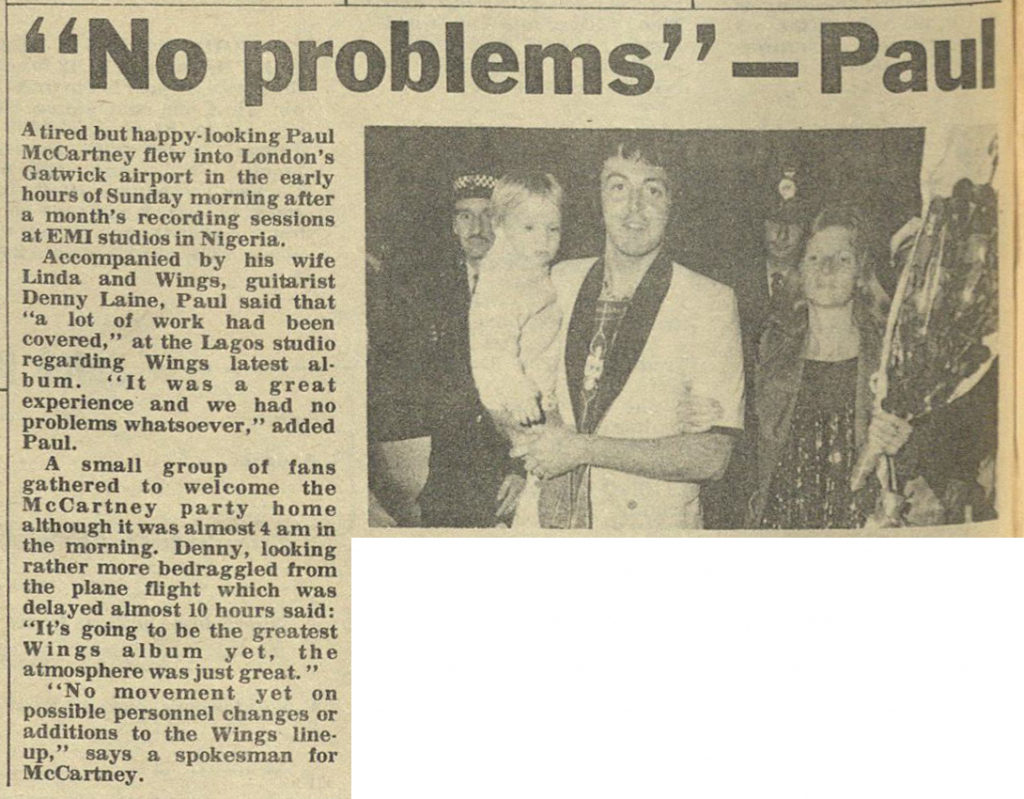

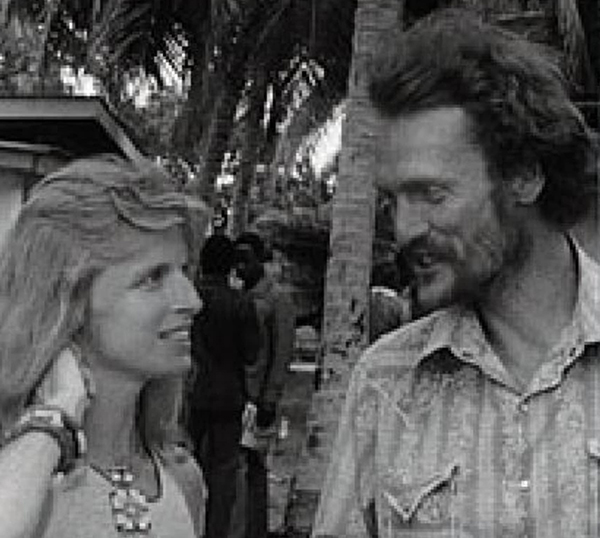

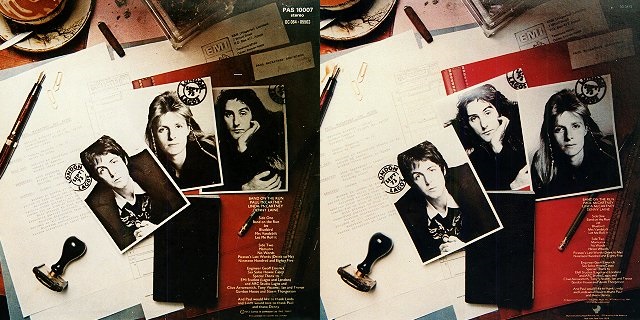
Going back to “Band on the Run,” on the back cover there’s little passport photos of Paul, then Linda, then you. On the American album, they’re reversed and you’re the one closest to Paul. Did you ever notice that? Is there some hidden meaning there?
No way! I don’t know. You experiment with the photographer, just like everything else. It’s like the guy who did the “Band on the Run” front cover, he had the wrong film in his camera! It turned out that it was sepia-toned. The color was just, like, weird because it wouldn’t have been that way with the right film. Then I think it was Paul or Linda [who] said, “We like the color.” And he went, “Oh, thank you,” [from] a mistake. A lot of things happen like that. You just make the most of it.
Denny Laine – From From the Moody Blues to Wings to the Rock Hall: Q&A with Denny Laine | Ideastream Public Media, February 15, 2023
For Band on the Run, what did you think when Paul and Linda decided to go to Lagos?
“I thought it was a great idea. I love going places where we’re going to be influenced by the local culture and music. Also, Ginger Baker had a studio there. We didn’t go there for that reason, but Ginger introduced us to some people, so we didn’t feel so alone [Note: Baker played percussion on Mamunia, shaking gravel in an old fire bucket]. The African drumming thing was a big influence on all of us.
“We were all into ethnic music, whether reggae or African or whatever. We sat around and looked at the map where all the EMI studios were and picked that one. ‘That sounds like it could be fun.’ Also, I think it might’ve been the only location available for when we wanted to go. I never had any negative feelings about going. I thought it was a nice change. There was a great energy there. Though we didn’t know it would be monsoon season. [Laughs]”
Denny Laine – From Guitar World, January 30, 2023
What was the studio like in Lagos?
“They didn’t have anything. It was all hand-me-down equipment. Half of it wasn’t even rigged up. There was a door in the back that opened up into a record-pressing plant, with, like, 60 people working away. As for the equipment, obviously we’d brought our own guitars and amps. Again, like on Red Rose Speedway, I was using the Telecaster and the Gibson Jumbo.”
Denny Laine – From Guitar World, January 30, 2023
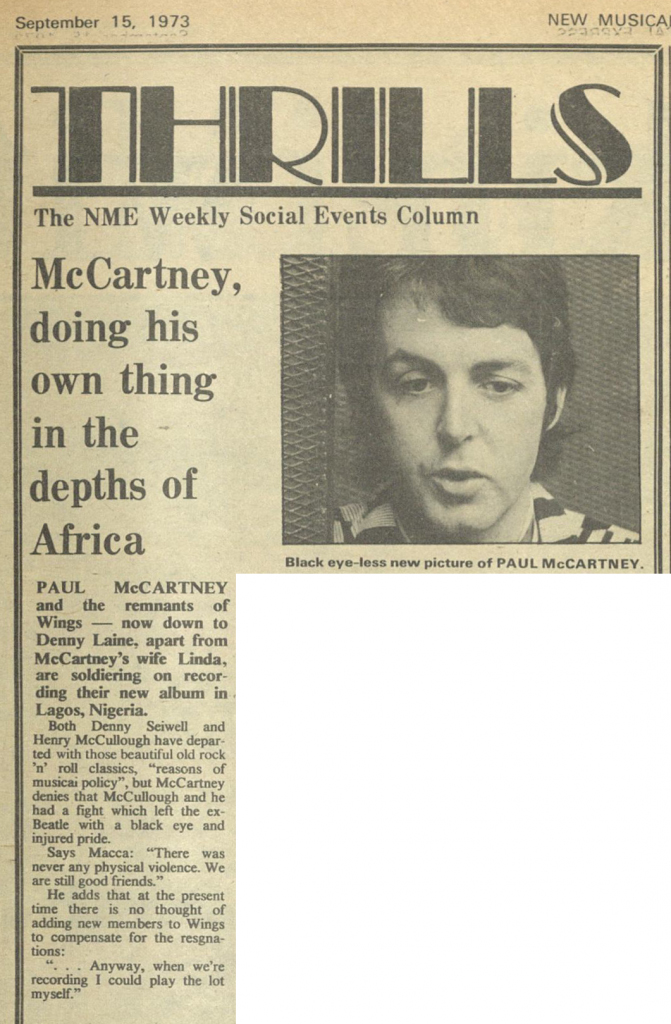
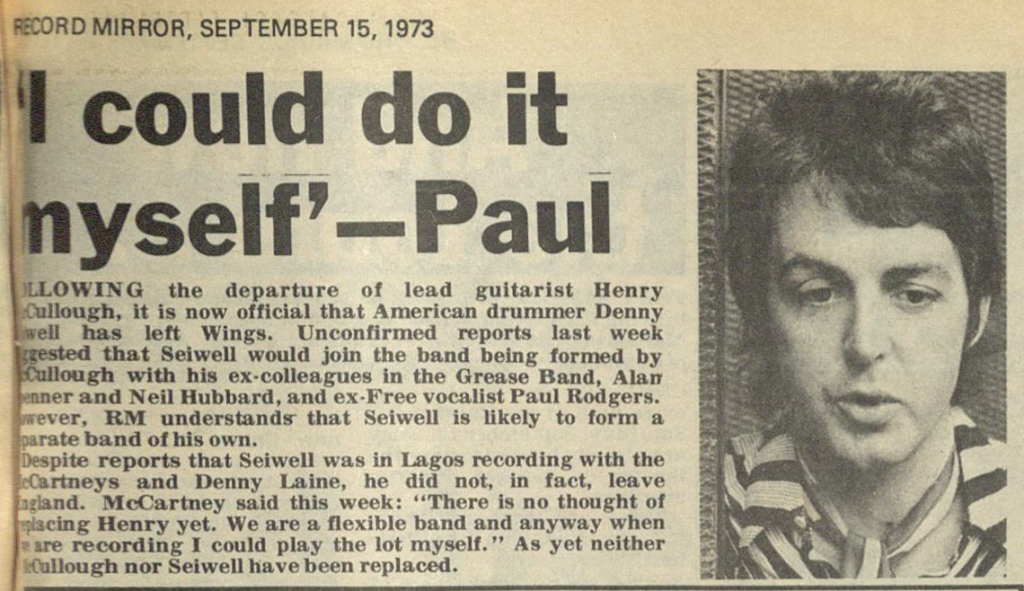
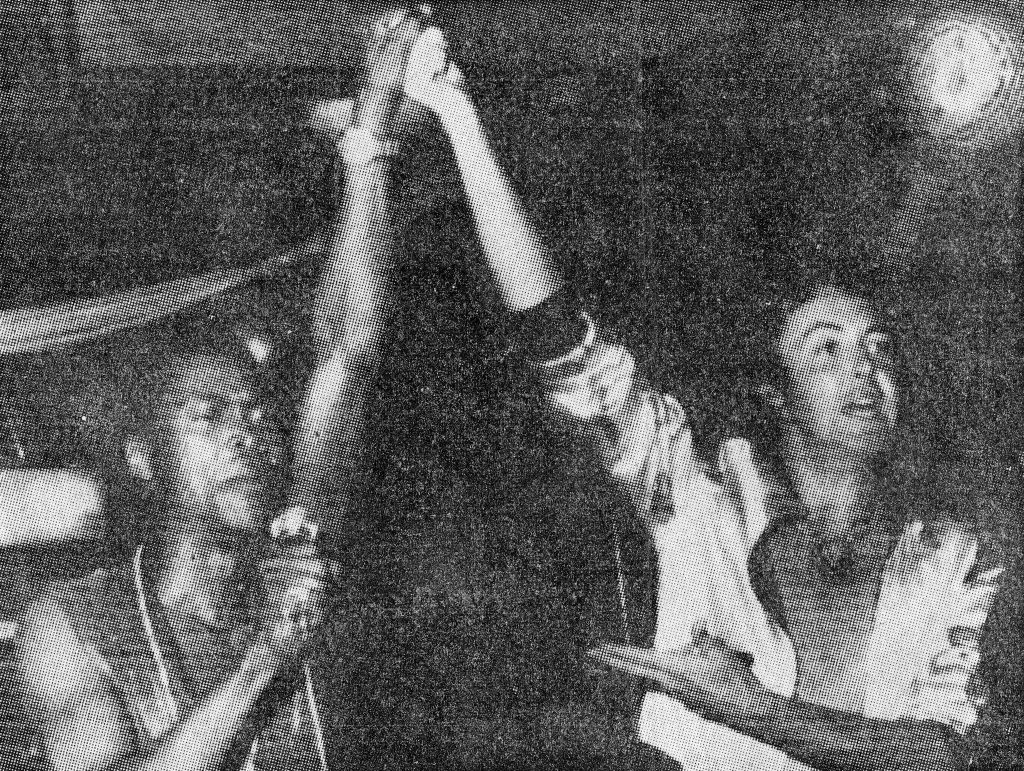
In order to move forward, you have to try new things. It’s like being a gambler. You gamble with things because it’s more exciting. It’s more appealing. It’s not the normal, everyday 9-to-5 job, it’s more of a ‘Let’s try something new.’
Denny Laine – From ‘Band on the Run’: Denny Laine on McCartney’s ‘Gamble’ of an Album – Billboard, May 2023
I know why [Band On The Run] was appreciated so much. Because it had a certain feel. It was basically just me and Paul doing the backing tracks. And it was more of a relaxed approach to doing an album than if you’re going in with a band and there are all these parts. We were thrown into that as a last resort because two of the guys didn’t come to Lagos.
Denny Laine – From ‘Band on the Run’: Denny Laine on McCartney’s ‘Gamble’ of an Album – Billboard, May 2023
When [Paul] said, ‘Let’s do it in Africa,’ I understood completely. We wanted to go somewhere where it was different. We’d be influenced by the music and the atmosphere, and it was far away from anything else we’d ever done. Because it was an EMI studio, I think they just put a pin in the map and said, ‘How about Africa?’ I just went: ‘Great, let’s do it.’
Denny Laine – From ‘Band on the Run’: Denny Laine on McCartney’s ‘Gamble’ of an Album – Billboard, May 2023
Because of his fame, of course, I was in the shadows more, but I wasn’t bothered by that at the time. I was traveling the world and learning a lot and having a good time in many ways. So from that point of view, it was easy for me. I’m very adaptable. When I’m around people who are not adaptable, I get a little bit nervous.
Denny Laine – From ‘Band on the Run’: Denny Laine on McCartney’s ‘Gamble’ of an Album – Billboard, May 2023
Me and Paul, we had the same influences musically and had known each other since the ’60s. It was just easy. It was easy to get a good groove on each other’s songs, and I think that’s what made the album popular.
We did it almost as though it was a home recording. A lot of the equipment that was out there really wasn’t workable. It was all hand-me-downs from EMI, and they really didn’t know what they were doing. And we kept it basic. No frills.
Normally, me and him would get together somewhere and write together — before we go in the studio. He’d come up with an idea, or I would, and then it would be a co-written thing. Or he would have written the songs and I would have known them before we go into the studio because we’d rehearsed them together. That’s what I really enjoyed about [Band on the Run]: the fact we were thrown in the deep end, and we had to swim, and we came up with that feel that we always had anyway.
Denny Laine – From ‘Band on the Run’: Denny Laine on McCartney’s ‘Gamble’ of an Album – Billboard, May 2023
It was just the three of us, and the input I had makes it stand out as something special. Me and him had this kind of feel together musically. We slotted in well together. We could read each other, and that came from growing up on the same musical influences. Paul’s got a good sense of rhythm, and he doesn’t overplay, which I like.
Denny Laine – Interview January 2023 – From Facebook


Written by Paul McCartney, Linda McCartney
Recording
Written by Paul McCartney, Linda McCartney
Recording
Written by Paul McCartney, Linda McCartney
Recording
Written by Paul McCartney, Linda McCartney
Recording
Written by Paul McCartney, Linda McCartney
Recording
Written by Paul McCartney, Linda McCartney
Recording
Picasso's Last Words (Drink To Me)
Written by Paul McCartney, Linda McCartney
Recording
Paul McCartney: Music Is Ideas. The Stories Behind the Songs (Vol. 1) 1970-1989
With 25 albums of pop music, 5 of classical – a total of around 500 songs – released over the course of more than half a century, Paul McCartney's career, on his own and with Wings, boasts an incredible catalogue that's always striving to free itself from the shadow of The Beatles. The stories behind the songs, demos and studio recordings, unreleased tracks, recording dates, musicians, live performances and tours, covers, events: Music Is Ideas Volume 1 traces McCartney's post-Beatles output from 1970 to 1989 in the form of 346 song sheets, filled with details of the recordings and stories behind the sessions. Accompanied by photos, and drawing on interviews and contemporary reviews, this reference book draws the portrait of a musical craftsman who has elevated popular song to an art-form.
Eight Arms to Hold You: The Solo Beatles Compendium
We owe a lot to Chip Madinger and Mark Easter for the creation of those session pages, but you really have to buy this book to get all the details!
Eight Arms To Hold You: The Solo Beatles Compendium is the ultimate look at the careers of John Lennon, Paul McCartney, George Harrison and Ringo Starr beyond the Beatles. Every aspect of their professional careers as solo artists is explored, from recording sessions, record releases and tours, to television, film and music videos, including everything in between. From their early film soundtrack work to the officially released retrospectives, all solo efforts by the four men are exhaustively examined.
As the paperback version is out of print, you can buy a PDF version on the authors' website

Notice any inaccuracies on this page? Have additional insights or ideas for new content? Or just want to share your thoughts? We value your feedback! Please use the form below to get in touch with us.